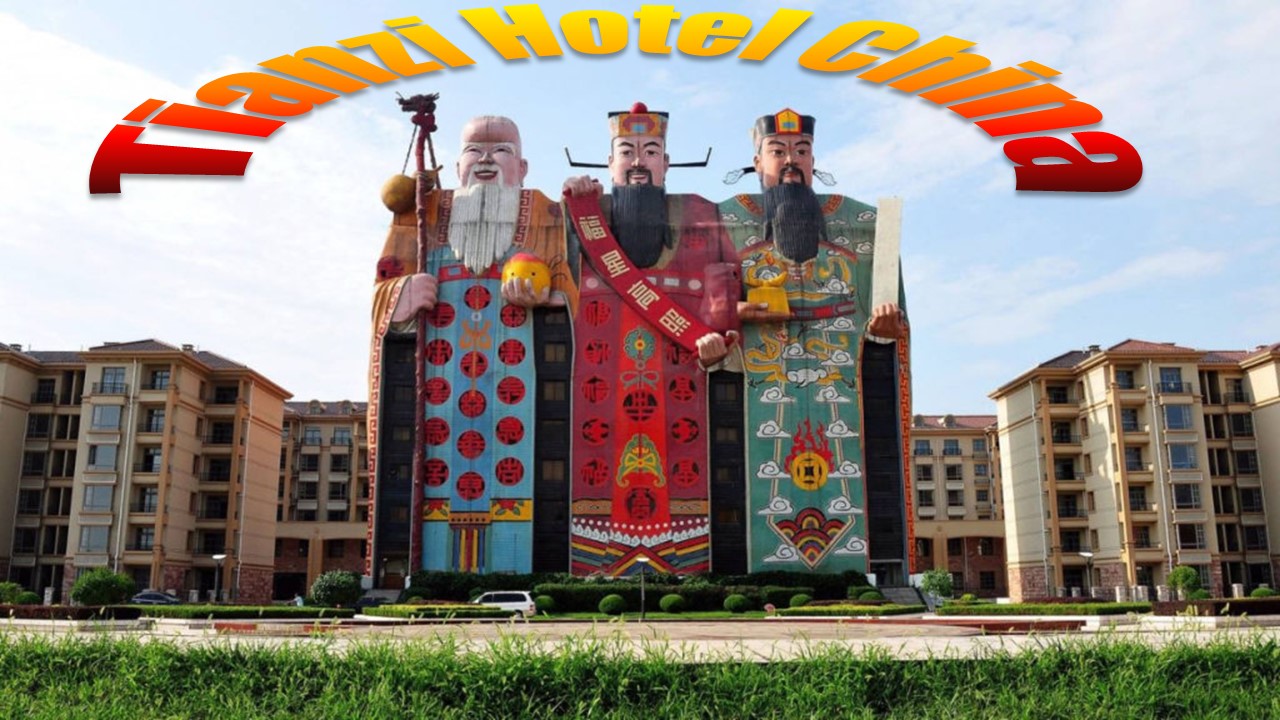China Tianzi Hotel - PowerPoint PPT Presentation
Title:
China Tianzi Hotel
Description:
An hour east of Beijing on the 930 bus, you’ll find the most bizarre guesthouse, The Tianzi Hotel (天子大酒店). Fu, Lu, and Shou are three "gods" that are also called the "Three Stars." Separately, they may be called Fu Xing, Lu Xing, and Shou Xing, with "Xing" meaning "star." The three gods -- legendary stars of blessings, prosperity, and longevity -- have been popular among people for centuries, which show the traditional culture of the Chinese people who long for happiness, prosperity, and longevity. The earliest record of their worship dates to the Imperial family of the Ming dynasty. Although their grouping is dated to this period, the three stars have been mentioned much earlier. The three stars are worshipped in Taoist temples and shrines. They also appear in sculptures, paintings and art work especially on gifts or items used on auspicious occasions. Sometimes, their respective characters are used as a decoration as well in home decorations and even Chinese pastries. – PowerPoint PPT presentation
Number of Views:8
Title: China Tianzi Hotel
1
Tianzi Hotel China
2
(No Transcript)
3
An hour east of Beijing on the 930 bus, youll
find the most bizarre guesthouse, The Tianzi
Hotel (?????). Well, if you thought it is a
statue then you are wrong! The Tianzi Hotel is a
ten-story high representation of Fu Lu Shou (good
fortune, prosperity and longevity) that
apparently holds the Guinness World Record for
the biggest image building.
4
Shou, the most venerable, his name means Star of
Long Life. He is old and bald, and always
carries a Golden Peach of Immortality from
XI-WANGMUs Holy Peach Garden. These are found
only in Heaven and ripen once every three
thousand years
5
(No Transcript)
6
The peach in the Shou's left hand represents
immortality - but if you look a little bit closer
you'll see that it has two little windows -
because it's actually a suite within the hotel
7
(No Transcript)
8
(No Transcript)
9
The Shou star is a Carinae (Canopus), the star of
the South Pole in Chinese astronomy, and is
believed to control the life spans of mortals.
According to legend, he was carried in his
mother's womb for ten years before being born,
and was already an old man when delivered. He is
recognized by his high, domed forehead and the
peach which he carries as a symbol of
immortality. The God of Longevity is usually
shown smiling and friendly, and he may sometimes
be carrying a gourd filled with Elixir of Life.
10
Located in Hebei province Tianzi Garden Hotel -
also known as The Emperor Hotel and Son of Heaven
Hotel. Built in 2000, the hotel has ten stories
and stands at a height of 41.6m.
11
(No Transcript)
12
The Lu star is Ursa Majoris, or, in traditional
Chinese astronomy, the sixth star in the Wenchang
cluster, and like the Fu star came to be
personified. The Lu star is believed to be Zhang
Xian who lived during the Later Shu dynasty.
13
The word lu specifically refers to the salary of
a government official. As such, the Lu star is
the star of prosperity, rank, and influence.
14
The Lu star was also worshipped separately from
the other two as the deity dictating one's
success in the Imperial Examinations, and
therefore success in the imperial bureaucracy.
The Lu star is usually depicted in the dress of a
mandarin.
The Lu star is usually depicted in the dress of a
mandarin.
15
The Confucian system of study followed by
examination and placement holds sway in all
Chinese-based cultures to this day, including
Japan. It was certainly seen as a key to the path
of prosperity.
16
Lu Xing was said to be the first star of the Big
Dipper, an auspicious star blessing ancient
intellectuals with a position in the civil
service. In the Song Dynasty (960-1279), Lu Xing
became another name for Scholar Star
17
(No Transcript)
18
(No Transcript)
19
(No Transcript)
20
The Fu star refers to the planet Jupiter. In
traditional astrology, the planet Jupiter was
believed to be auspicious. Alternatively,
according to Taoist legend in Ming Dynasty, the
Fu Star is associated with Yang Cheng, a governor
of Daozhou in Western Han (206 BC - 24 AD).
21
Yang Cheng risked his life by writing a memorial
to the emperor to save the people from presenting
dwarf slaves as the special tribute to the
imperial court. After his death, the people built
a temple to commemorate him, and over time he
came to be considered the personification of good
fortune.
22
Fu is generally depicted in scholar's dress,
holding a scroll, on which is sometimes written
the character "Fu". He may also be seen holding a
child, or surrounded by children.
23
Fu, Lu and Shou are deities which symbolize
happiness, wealth and longevity. They are
represented and depictured together since they
provide symbolism as a unity and they enhance
each one of their powers by this union.
24
(No Transcript)
25
(No Transcript)
26
(No Transcript)
27
(No Transcript)
28
(No Transcript)
29
Almost every folk (non-Buddhist and not
specifically Taoist) temple that has a
representation of the Fu Lu Shou somewhere
30
Singapore
31
Text and pictures Internet Copyright All the
images belong to their authors Presentation
Sanda Foisoreanu
2015
Sound The Last Emperor - R.Sakamoto
D.Byrne































